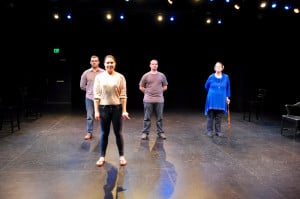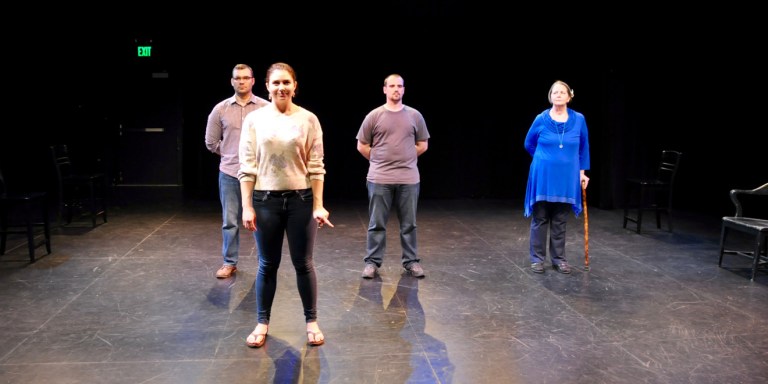“Telling: Stanford,” a production based on the stories of five members of Stanford’s military-affiliated community, will debut this Thursday evening.
The show will be the 36th installment of The Telling Project, a Texas-based national performing arts nonprofit that seeks to promote understanding between civilians and the military by helping veterans and other members of the military community share their stories through theater.
“We think of veterans as having PTSD, or being suicidal, or being alcoholic or homeless,” said Max Rayneard, senior writer and producer of The Telling Project and writer of “Telling: Stanford.” “What The Telling Project does is, it takes people and puts them in a room with other people.”

“Veterans are no longer identified by their issues, but they are identified by their presence, by who they are,” he added.
Assembling the Stanford production
Since its founding in 2008, The Telling Project has developed original productions in 19 states and 31 cities. Alex Mallory ’08, the director of “Telling: Stanford,” spearheaded bringing The Telling Project to Stanford after discussing the nonprofit with Roberta Denning, chair of Stanford’s Arts Advisory Council.
Mallory coordinated with Dustin Noll, Stanford’s Office for Military Affiliated Communities (OMAC) specialist, to reach out to members of the local military-affiliated community.
The show’s cast includes two current Stanford students, Leslie Bridges ’17 and Randall Holmes ’14 M.S. ’17. “Telling: Stanford” also features Bobby McLean, an alumnus of Stanford’s 2to4 veteran accelerator program; Leana Litchfield, the wife of the Associate Vice Provost for Finance and Administration; and Victoria Sanders, a member of the local community.
Cast members’ experiences in the military span the past four decades and provide diverse perspectives. Both Holmes and McLean served in the U.S.’s most recent wars. Holmes served as a human intelligence collector in Iraq, while McLean served as an Army ranger on multiple tours in Iraq and Afghanistan. Litchfield is the wife of a 25-year retired Navy officer; Sanders is a veteran of the U.S. Army who served from 1975-76; Bridges is currently in Marine Officer Candidate School and has a brother serving in the U.S. Marines.
“They are all very different and give very different perspectives,” Bridges said of her fellow cast members. “I think it is a really fun mix.”
Sharing personal stories
Reinard compiled the three-act script for “Telling: Stanford” from interviews with each cast member.
“It is not about me writing a script for the veterans,” Rayneard said. “It is about me facilitating a process whereby they take ownership of their own stories on stage.”
The first act is ensemble-based and focuses on the cast’s introduction to the military. The second act, told in monologue, presents the moments that defined each cast member’s experience with the military. Finally, the third act is conversational and deals with coming home and reentering civilian life.
“There’s some parts that are very serious and thought-provoking but it’s not just one-sided,” Bridges said. “It is very nuanced and I think that’s what makes it beautiful.”
Bridges said that participating in “Telling: Stanford” has been difficult at times.
“This is a very weird theater piece for me because I am playing myself,” she said. “I am not playing a character. It is more vulnerable.”
This vulnerability has been challenging even for cast members who have experience telling their personal stories.
“I came out of the rape closet in 2013,” Sanders said, “so I have kind of told my story in a different kind of atmosphere.”
An activist for reform of prosecution protocols in military sexual assault cases and for the care of military sexual trauma survivors, Sanders has testified before Congress and the state, and has given multiple interviews. However, she said that “Telling: Stanford” was a new experience.
“[“Telling: Stanford”] was appealing to me because it is a different way of dealing with the same subject matter,” she said.
Bridging a divide
“When we think about the military we think about it happening somewhere else, far away,” Rayneard said. He said the show demonstrates that “veterans are in our community.”
According to Noll, there are currently 135 veteran or active-duty students and 13 ROTC students on campus. In addition, many Stanford students have parents who are or were in the military.
Bridges said that she is “very interested in the issue of bridging the civil-military divide.” This spring, she will lead an Alternative Spring Break program sponsored by the Haas Center and OMAC that will travel to Washington, D.C. to learn about the military as well as civilian leadership.
“I am [kind of] in the [civil-military] divide, because I am not a veteran,” she said. “I am still just a candidate. But I am a student, too, and I know a little about both now.”
Sanders emphasized the need for civilians to understand “not just the overall, but the very personal nature” of military service.
“My story is of sexual assault,” she said. “Another guy’s story is that he was angry and wanted to kill somebody. There are all of these different aspects to military life that you don’t necessarily read in the newspaper. You don’t hear people telling their personal story of what happened.”
“Telling: Stanford” will hold five performances over the next week. The first three will take place at the Nitery on Feb. 18-20 at 8 p.m. On Feb. 23, a performance will be held at the Graduate School of Business at 7 p.m. A final performance will take place on Feb. 25 at Branner Lounge at 7 p.m. Admission to all performances is free.
Contact Blanca Andrei at bandrei ‘at’ stanford.edu.
An earlier version of this article misspelled Roberta Denning and Max Rayneard’s names. The Daily regrets this error.
